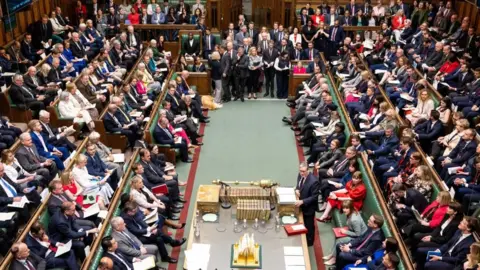In the current political landscape, Chris Mason observes that the Labour Party, under the leadership of Prime Minister Sir Keir Starmer, faces considerable challenges in persuading its own members regarding recent welfare changes. The political atmosphere has been notably strained, with some ministers humorously lamenting that the quality of interactions has diminished significantly since the contentious Brexit debates.
The Labour government boasts a substantial parliamentary majority of 165. In an ideal scenario, this would afford it greater confidence and less internal friction. Yet, despite this advantageous position, Labour finds itself embroiled in intensive debates surrounding significant policy shifts, particularly in the area of social welfare. Starmer is expected to personally engage in these persuasive efforts, emphasizing that the proposed changes are not only consistent with Labour’s core values but also crucial for maintaining the long-term stability of the welfare state.
On Monday, the Work and Pensions Secretary, Liz Kendall, addressed the House of Commons with the aim of reassuring Labour MPs regarding the government’s benefit reforms. However, her message may not have resonated as intended, leaving many MPs skeptical. One backbencher noted mixed reactions, suggesting that while the reforms might eventually pass, they could face a tougher battle than anticipated.
There are currently discussions that indicate a significant faction within Labour, estimated at around 40 to 50 MPs, could oppose these reforms. Given the sheer size of the majority in Parliament, if a concerted group of rebels aims to defeat the government on these changes, they would need around 80 MPs to collaborate in voting against the amendments. The outcome also hinges on how many MPs choose to abstain during the vote scheduled for Tuesday evening.
Political analysts like Professor Philip Cowley from Queen Mary University of London highlight that Starmer’s greatest rebellion so far has involved 16 MPs, a contrast to the much larger dissent during Tony Blair’s first year in office over welfare issues. This context underscores the significance of public and political sentiment surrounding welfare state transformations in the UK.
Integral to the current debates is the plan to revise the eligibility criteria for the Personal Independence Payment (PIP), a primary disability benefit, set to take effect by November 2026. The Labour coalition garnered hopes that a review by Minister Sir Stephen Timms, incorporating the experiences of disabled individuals, would reassure MPs. However, there is concern that the timing of this review—scheduled to conclude after the eligibility changes are set to be implemented—fails to allow adequate influence over the anticipated reforms.
Critics within Labour, including some MPs and ministers, have voiced their discontent, seeing the timing and rationale behind the changes as insufficiently justified. They argue that the adjustments seem designed more to align with fiscal targets set by Chancellor Rachel Reeves than to advocate for the welfare of vulnerable populations. This sentiment reflects a growing apprehension that the government’s approach may compromise foundational Labour principles regarding social justice and support for those in need.
Notably, amidst the robust discourse, there lurks a quieter group of Labour MPs who argue that this internal strife over benefits is unwarranted and reflects poorly on the party’s collective mission. They stress that managing a rising benefits bill is a serious concern and contend that Labour’s credibility as economic stewards is crucial to its long-term electoral strategy.
The atmosphere within the party is further complicated by the Chief Whip Sir Alan Campbell’s call for unity, suggesting that fractures arising from the ongoing debate should not jeopardize collective efforts moving forward. As MPs prepare for continued discussions on this contentious issue, the road ahead remains fraught with potential conflict and division, but also opportunities for reinforcing a cohesive Labour identity as they navigate the complex intersections of policy, economic stewardship, and social responsibility.











